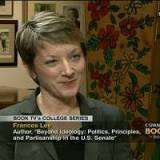Frances E. Lee
Frances E. Lee is an American political scientist and a professor of politics and public affairs at the Woodrow Wilson School of Public and International Affairs at Princeton University.[1] She previously taught at Case Western Reserve University and the University of Maryland, College Park.[2][3] Lee specializes in American politics with particular interest focusing on the U.S. Congress and institutional behavior.[4] Lee is co-editor of Legislative Studies Quarterly[5] and is the first editor of Cambridge University's American Politics Elements Series.[6] Her 2009 book Beyond Ideology was the first academic work to define the role of partisanship in voting behavior within the US Senate and has been cited since then over 400 times in contemporary political science.[7] Lee is also a co-author of the seminal textbook on congressional study, Congress and Its Members, currently in its sixteenth edition.[8]
Frances E. Lee | |
|---|---|
 Lee in 2010 appearing on CSPAN | |
| Occupation | Author, Professor |
| Nationality | American |
| Education | University of Southern Mississippi (B.A.) Vanderbilt University (Ph.D.) |
| Genre | Political Science |
Lee graduated with honors from the University of Southern Mississippi with a B.A. in English in 1991 and then pursued graduate studies at Vanderbilt University, from where she graduated with a Ph.D. in political science in 1997 after completing a doctoral dissertation, titled "The enduring consequences of the Great Compromise: Senate apportionment and congressional policymaking", under the supervision of Bruce I. Oppenheimer.[9]
Awards
- E. E. Schattschneider Award from the American Political Science Association (1997)[10]
- D.B. Hardeman Prize from the Lyndon Baines Johnson Foundation (1999 and 2009)
- Richard F. Fenno Award from the American Political Science Association (2009)[4]
- Member of the American Academy of Arts and Sciences, elected 2019[11]
Books
- Lee, Frances E. and Nolan McCarty, eds. 2019. Can America Govern Itself? New York: Cambridge University Press.
- Lee, Frances E. 2016. Insecure Majorities: Congress and the Perpetual Campaign. Chicago: University of Chicago Press.
- Schickler, Eric and Frances E. Lee, eds. 2011. The Oxford Handbook of the American Congress. New York: Oxford University Press. Selected by Choice, the American Library Association’s reviews publication, as one of its top 25 outstanding academic titles for 2012. Part of the Oxford Handbooks of Political Science series
- Lee, Frances E. 2009. Beyond Ideology: Politics, Principles and Partisanship in the U.S. Senate. Chicago: University of Chicago Press.
- Lee, Frances E. and Bruce I. Oppenheimer. 1999. Sizing Up the Senate: The Unequal Consequences of Equal Representation. Chicago: University of Chicago Press.
Selected publications
- Lee, Frances E. Forthcoming 2018. “The 115th Congress and Questions of Party Unity in a Polarized Era.” Journal of Politics.
- Lee, Frances E. 2016. “Patronage, Logrolls, and Polarization: Congressional Parties of the Gilded Age, 1876-1896.” Studies in American Political Development 30: 116-127.
- Lee, Frances E. 2015. “How Party Polarization Affects Governance,” Annual Review of Political Science 18 (June): 261-282.
- Lee, Frances E. 2013. “Presidents and Party Teams: The Politics of Debt Limits and Executive Oversight, 2001-2013,” Presidential Studies Quarterly 43 (4): 775-791.
- Lee, Frances E. 2008. “Dividers, Not Uniters: Presidential Leadership and Senate Partisanship, 1981-2004” Journal of Politics 70 (October): 914-928.
- Lee, Frances E. 2008. “Agreeing to Disagree: Agenda Content and Senate Partisanship, 1981-2004.” Legislative Studies Quarterly 33 (May): 199-222.
- Lee, Frances E. 2004. “Bicameral Institutions and Geographic Politics: Allocating Federal Funds for Transportation in the House and Senate,” Legislative Studies Quarterly 24 (May): 185-214.
- Lee, Frances E. 2003. “Geographic Politics in the U.S. House of Representatives: Coalition Building and Distribution of Benefits,” American Journal of Political Science 47 (November): 713-727. September 2018, p. 3
- Lee, Frances E. 2000.“Senate Representation and Coalition Building in Distributive Politics,” American Political Science Review, 94 (March) 59-72.
Editorial Service
As Editor
- Legislative Studies Quarterly (Co-editor) (2014–present)
- Elements Series in American Politics, Cambridge University Press (2017–present)
Editorial Boards
- American Journal of Political Science (2014–present)
- American Politics Research (2007–present)
- Congress & the Presidency (2007–present)
- Journal of Politics (2007-2009, 2013-2015)
- Legislative Studies Quarterly (2005-2010)
Media
- Interview with Ezra Klein of Vox Media about gridlock.[12]
- Interview on C-SPAN discussing majoritarian rule in the Senate.
- Contributor to The Washington Post[13]
Further reading
- The Federalist Society[14]
- Washington Monthly
- Amazon Author Page[15]
- Frances E. Lee publications indexed by Google Scholar
References
- "Frances E. Lee". scholar.princeton.edu. Retrieved 2020-06-07.
- "Friday's Public Affairs Discussion Group to tackle Congress's insecure majorities, perpetual campaigns". October 21, 2012. Retrieved April 11, 2020.
- "Insecure Majorities: Congress and the Permanent Campaign". Case Western Reserve University. October 22, 2012. Retrieved April 11, 2020.
- "Frances Lee". Gvpt.umd.edu. Archived from the original on 2015-12-23.
- Brian Crisp; Christopher Kam; Thad Kousser; Frances E. Lee (eds.). "General & Introductory Political Science". Legislative Studies Quarterly. 43. eISSN 1939-9162. ISSN 0362-9805.
- "American Politics". Cambridge.org.
- "Google Scholar". Scholar.google.com.
- Davidson, Roger H.; Oleszek, Walter J.; Lee, Frances E.; Schickler, Eric (July 2017). Congress and its members (16th ed.). Thousand Oaks, CA. ISBN 978-1-5063-6973-0. OCLC 961410670. OL 27411806M.
- Lee, Frances. "The enduring consequences of the Great Compromise: Senate apportionment and congressional policymaking". catalog.library.vanderbilt.edu. Retrieved 2020-06-07.
- "E.E. Schattschneider Award Recipients". Apsanet.org.
- "Frances E. Lee". American Academy of Arts & Sciences. Retrieved 2020-06-07.
- "Why presidential leadership can't solve gridlock". Youtube.com.
- Frances Lee (July 21, 2017). "Repeal-and-replace is probably doomed. Congress rarely works along party lines". Washingtonpost.com.
- "Frances E. Lee | the Federalist Society". Fedsoc.org.
- "Frances E. Lee Books". Amazon.com. Retrieved 24 January 2019.